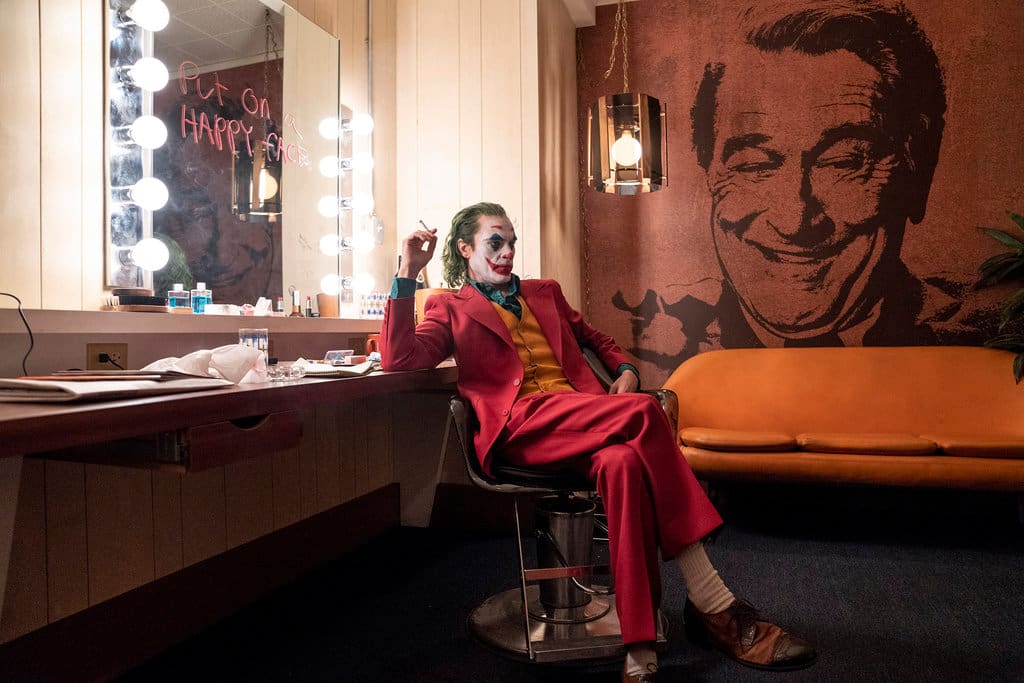
The Alamo Drafthouse has a tradition of showing a funny clip before screenings to remind the audience of its no phones or talking policy. Sometimes it’s a scripted bit featuring the actors in the movie, like Brie Larson and Samuel L. Jackson before Captain Marvel. Sometimes it’s a homemade clip that’s better than the movie itself, like the stop motion animation of Godzilla toys before Godzilla: King of Monsters. For Joker, the “gritty” new take on the infamous Batman villain, it’s one of the theater’s favorites: Arnold Schwarzenegger’s Dr. Fries/Mr. Freeze from 1997’s Batman & Robin icing a henchman who interrupts his wedding video viewing. Though Joel Schumacher’s film is supposed to look silly in comparison to director Todd Phillips’ interpretation of Gotham City, of the two, it’s actually the film with both more coherent storytelling and artistic integrity.
Co-written by Phillips and Scott Silver, Joker stars Joaquin Phoenix as Arthur Fleck, a party clown with aspirations of becoming a stand-up comedian, who turns supervillain because of the way he’s beaten down by an unjust world. Everyone is mean to Arthur from the woman on the bus who scolds him for making her child laugh, to his own mother, who responds to his career aspirations by suggesting he’d have to be funny to be a comedian. Phillips and Silver’s Gotham is a crappy town not just because of a garbage strike and an infestation of “super rats,” but because — as the film literally tells us repeatedly — the people of Gotham are angry. Mostly, the film blames that on the income inequality embodied here by Thomas Wayne (Brett Cullen), a rich businessman who’s got his eye on the Mayor’s office.
The problem with that “eat the rich” reasoning, though, is that the film never actually justifies Gotham’s anger on either a macro or micro level. Instead, Phillips relies too much on the viewer’s own experience of real-world Occupy Wall Street sentiments and the grimy New York City milieu he copies from Scorsese films about similarly disaffected men like Taxi Driver or, more importantly, King of Comedy. While there’s nothing inherently wrong with using those films as visual and ideological shorthand, it also exposes Joker’s weaknesses. The film is allegedly set during the ’80s like King, but the production design suggests the previous decade and not giving the viewer a clearer sense of time and place makes it even more difficult to draw parallels between the film’s universe and ours.
Still, even that incoherence could be dismissed if it didn’t carry into the character work as well. Thanks to neurological damage Arthur sustained before we met him, he has a condition where he laughs uncontrollably at inappropriate times. It’s a distinct tick and one that not only makes up the meat of Phoenix’s performance, but also not bad enough to really justify how horribly people treat Arthur. Instead, the reason he has to be repeatedly beat down is in order to justify his eventual acts of violence and the script feels as if it knows it has to get to that point but doesn’t do the work to get there. And yet by the time Arthur shoots three finance bros who bully him on the train, Arthur has been portrayed as so harmless that the decision seems to come out of nowhere.
Rather, for a film that’s so determined to ignore its comic book pedigree, it’s when it goes baroque in its final act and stops trying to ground Arthur’s arc in causality or even reality that it finally begins to work. Watching Phoenix in full clown make-up cause a riot on a crowded subway full of Gothamites already inspired by his earlier violence or spar verbally with Robert DeNiro as talk show host/comedian, Murray Franklin, it’s difficult to deny what a great Joker he could have been in a better film. And while that anarchic, disturbed incel triumphant ending is precisely what’s made the film so controversial in the first place, the work done to get to that point is so shoddy that it’s hard to imagine it making much impact at all.
For all the handwringing over Joker’s release to call it dangerous simply imbues it with more coherence and power than it actually has. The last act is undeniably effective, but the reason it works is because it leaves behind all the self-aggrandizing realism of the central conceit and becomes the outlandish comic book material Phillips and Silver have tried so hard to reject. Maybe a few misanthropic boys with an unjustified victim complex and a penchant for violence will see a rallying cry in this story, but it doesn’t make them look like products of a broken society, it just makes them look pathetic.


Maybe you’re just too fancypants to “get” the movie, Marisa. It’s bigger than “people are mean to Arthur” and “he has a neurological disorder”. The mental health system lets him down. He wants his medication but funding is cut. He tries to be a good person, time and time again. If you got the crap kicked out of you and were unstable to begin with, and you learn he is abandoned and lied to be EVERYONE HE KNOWS (with the exception of Gary, who was always nice to him), you may snap, too. You obviously didn’t want to like the movie so, you didn’t.